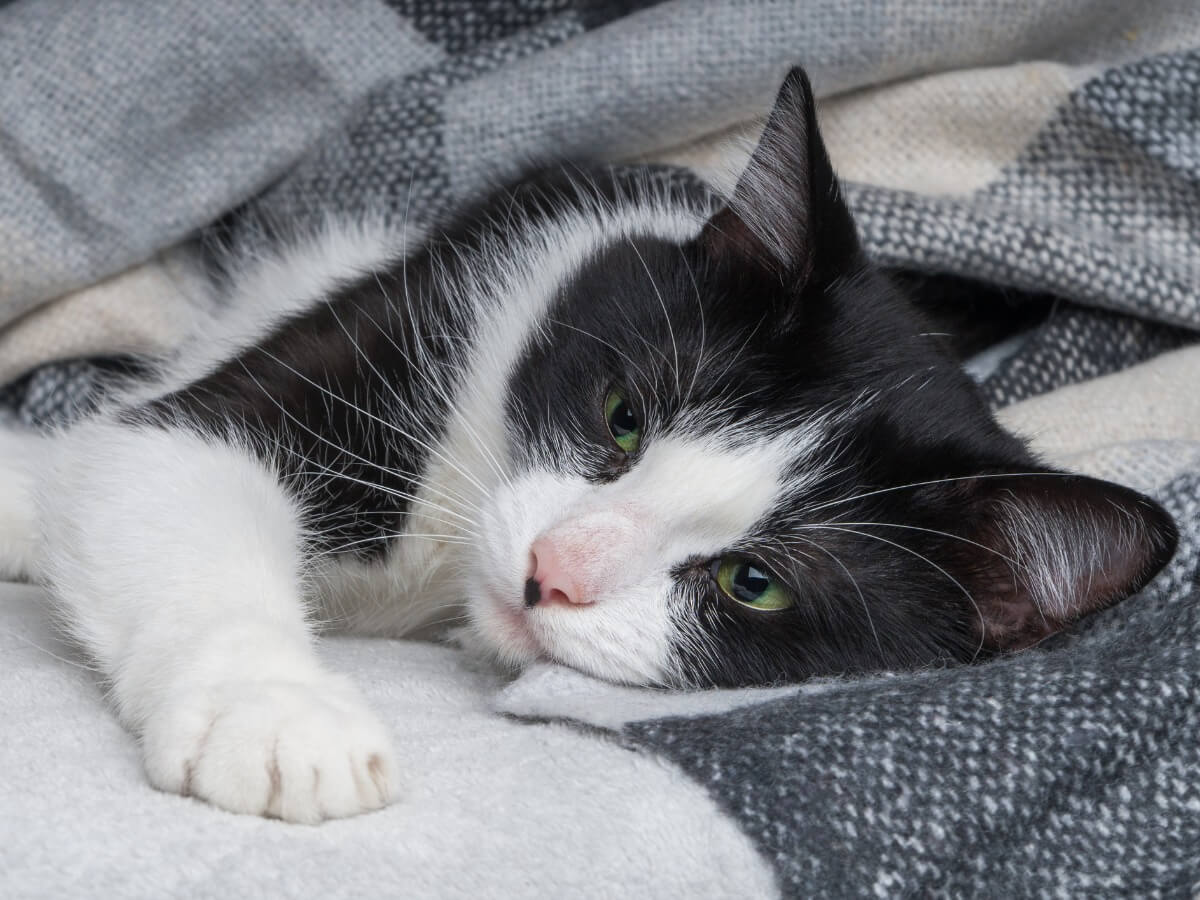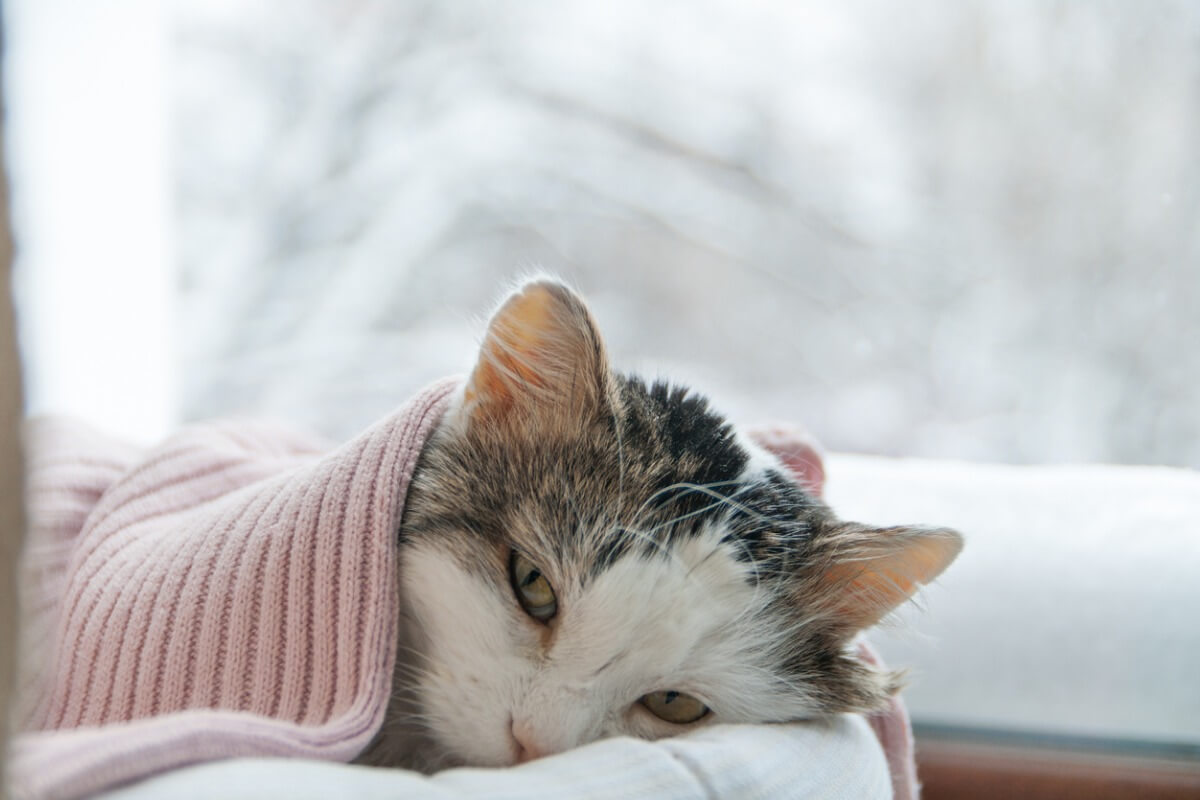Gastritis in Cats: Causes, Symptoms and Treatment


Written and verified by the biologist Samuel Sanchez
Isolated gastric illnesses are common in domestic pets, because they tend to eat all sorts of things that they shouldn’t, simply due to curiosity or a desire to attract their tutor’s attention. It’s normal for your cat to vomit from time to time, but it can become serious if this continues for weeks. Did you know that cats can also suffer from gastritis?
This general condition can occur sporadically (acute) or be long-term (chronic). If you want to know all about gastritis in cats, including diagnosis and treatment, read on. It’s possible that a serious pathology may be affecting your pet and it’s time to take action.
What’s gastritis in cats?
A cat’s digestive system includes the mouth, teeth, salivary glands, esophagus, stomach, intestines, pancreas, liver, and gallbladder. This system has four main functions: digesting food, absorbing nutrients from the food, moving organic matter through the body, and eliminating the resulting fecal compounds.
Several disorders can disrupt any of the biological processes that take place in the digestive system. Gastritis, on the other hand, is defined as a stomach illness characterized by inflammation of the mucosa lining the gastric cavity. It shouldn’t be confused with enteritis, because in the latter the inflammation occurs in the intestine.
This clinical condition has two variants, which are defined by the duration of symptoms:
- Acute gastritis: Causes sporadic symptoms (during 24-48 hours) and is usually self-resolving, that is, it disappears without medical help. The cause is usually simple, such as the ingestion of rotten food.
- Chronic gastritis: This pathological variant causes symptoms that last for 2 weeks or more. Its etiology is more complex and the cause lies in many cases in a digestive or systemic disease.
Most cases of gastritis are acute and don’t usually require veterinary attention. However, the intensity or duration of symptoms may indicate the need to visit the vet promptly.

Causes of gastritis in cats
As indicated by veterinary portals, gastritis in cats can have many causes. We’re going to highlight a few, but you should keep in mind that the etiology of this condition is very broad:
- Diabetes: Diabetic conditions cause gastrointestinal symptoms in both cats and humans. Ketoacidosis resulting from untreated diabetes explains some cases of gastritis.
- Gastrinoma: Gastrinoma is a very rare type of pancreatic tumor in the feline world. This neoplasm causes too many acidic compounds to be released into the cat’s stomach, resulting in chronic gastritis.
- Immune-mediated diseases: In some cases, the cat’s own protective cell bodies end up attacking the gastric tissue by mistake. Very little is known about this type of feline disease.
- Indigestion: The consumption of an overly acidic, fatty, or spicy substance is one of the most common causes of gastritis in cats. This condition is transitory and isn’t considered serious.
- Infections and parasites: Many pathogens invade the intestinal tract, but few can withstand the acidic conditions of the stomach. Studies have shown that the bacterium Helicobacter pylori is associated with this condition in both felines and humans.
Ultimately, it’s worth noting that some cases of gastritis in cats don’t have a specific cause. This means that they’re idiopathic and treatment will be limited to alleviating the symptoms, but not the possible underlying disease.
Symptoms
The symptoms of feline gastritis are usually quite unspecific and they vary depending on the cause and duration of the condition. The most common symptoms are listed below:
- Diarrhea
- Weight loss
- Repeated vomiting. Not to be confused with regurgitation, as the latter is superficial and doesn’t involve gastric emptying.
- Black and oily stools.
- Dehydration resulting from vomiting and diarrhea. This, in turn, may result in the need to drink water.
- Excessive drooling and licking of lips
- Depression and lethargy
- Abdominal pain
Detecting signs of disease in felines is quite difficult, as these animals are natural predators and have perfected the concealment of their symptoms over thousands of years. Therefore, you should pay special attention to quantifiable parameters (the consistency of the feces and the amount of food that your cat consumes, for example).
Diagnosis of gastritis in cats
Once in the veterinary clinic, professionals will perform a variable number of tests on the cat. A blood test, urinalysis, stool culture (fecal analysis), abdominal ultrasound, and endoscopy may be necessary. However, these advanced procedures are reserved for severe or chronic cases. A biopsy of stomach tissue provides a definitive diagnosis.
Acute gastritis, on the other hand, is usually diagnosed with a blood test, a urine test, and direct observation of vomit. Also, any information that the owner can provide (how long the symptoms last, what the cat eats, if the cat has lost weight, and much more) will be essential.
Treatment
The treatment of gastritis in cats depends entirely on the causative agent. Most acute cases resolve on their own within a couple of days, but chronic cases need veterinary care. However, if the symptoms are severe, the feline will be prescribed antiemetics (to prevent vomiting), fluid therapy to prevent dehydration, and stomach protectors.
Most likely, in an acute case, the feline patient can go home after the visit to the veterinarian. It’s usually recommended to follow the following steps at home so that the animal’s symptoms improve:
- You shouldn’t feed your cat for the first 8-12 hours. Don’t deprive your cat of water, otherwise it could become dehydrated. If fluids can’t be administered without the cat vomiting again, return to the vet.
- If the vomiting stops after the above interval, you can offer the cat low-fat, digestible food. Rice with cooked chicken is an excellent dish. Divide half of the cat’s daily intake into 4-6 small meals.
- Increase the amount of food given over the next 2-3 days until the cat is back to normal.
If the cat starts vomiting again at any part of the process, go back to the vet. It’s probably not a severe condition, but it’s always better to be safe than sorry.

As you may have seen, gastritis in cats is a multifactorial disease that can’t be diagnosed at home. If your cat vomits for more than 24 hours, don’t hesitate to go to the vet. It’s most likely an acute condition, but prevention is always better than cure. Antiemetics and stomach protectors will make your feline cope better with the illness.
Isolated gastric illnesses are common in domestic pets, because they tend to eat all sorts of things that they shouldn’t, simply due to curiosity or a desire to attract their tutor’s attention. It’s normal for your cat to vomit from time to time, but it can become serious if this continues for weeks. Did you know that cats can also suffer from gastritis?
This general condition can occur sporadically (acute) or be long-term (chronic). If you want to know all about gastritis in cats, including diagnosis and treatment, read on. It’s possible that a serious pathology may be affecting your pet and it’s time to take action.
What’s gastritis in cats?
A cat’s digestive system includes the mouth, teeth, salivary glands, esophagus, stomach, intestines, pancreas, liver, and gallbladder. This system has four main functions: digesting food, absorbing nutrients from the food, moving organic matter through the body, and eliminating the resulting fecal compounds.
Several disorders can disrupt any of the biological processes that take place in the digestive system. Gastritis, on the other hand, is defined as a stomach illness characterized by inflammation of the mucosa lining the gastric cavity. It shouldn’t be confused with enteritis, because in the latter the inflammation occurs in the intestine.
This clinical condition has two variants, which are defined by the duration of symptoms:
- Acute gastritis: Causes sporadic symptoms (during 24-48 hours) and is usually self-resolving, that is, it disappears without medical help. The cause is usually simple, such as the ingestion of rotten food.
- Chronic gastritis: This pathological variant causes symptoms that last for 2 weeks or more. Its etiology is more complex and the cause lies in many cases in a digestive or systemic disease.
Most cases of gastritis are acute and don’t usually require veterinary attention. However, the intensity or duration of symptoms may indicate the need to visit the vet promptly.

Causes of gastritis in cats
As indicated by veterinary portals, gastritis in cats can have many causes. We’re going to highlight a few, but you should keep in mind that the etiology of this condition is very broad:
- Diabetes: Diabetic conditions cause gastrointestinal symptoms in both cats and humans. Ketoacidosis resulting from untreated diabetes explains some cases of gastritis.
- Gastrinoma: Gastrinoma is a very rare type of pancreatic tumor in the feline world. This neoplasm causes too many acidic compounds to be released into the cat’s stomach, resulting in chronic gastritis.
- Immune-mediated diseases: In some cases, the cat’s own protective cell bodies end up attacking the gastric tissue by mistake. Very little is known about this type of feline disease.
- Indigestion: The consumption of an overly acidic, fatty, or spicy substance is one of the most common causes of gastritis in cats. This condition is transitory and isn’t considered serious.
- Infections and parasites: Many pathogens invade the intestinal tract, but few can withstand the acidic conditions of the stomach. Studies have shown that the bacterium Helicobacter pylori is associated with this condition in both felines and humans.
Ultimately, it’s worth noting that some cases of gastritis in cats don’t have a specific cause. This means that they’re idiopathic and treatment will be limited to alleviating the symptoms, but not the possible underlying disease.
Symptoms
The symptoms of feline gastritis are usually quite unspecific and they vary depending on the cause and duration of the condition. The most common symptoms are listed below:
- Diarrhea
- Weight loss
- Repeated vomiting. Not to be confused with regurgitation, as the latter is superficial and doesn’t involve gastric emptying.
- Black and oily stools.
- Dehydration resulting from vomiting and diarrhea. This, in turn, may result in the need to drink water.
- Excessive drooling and licking of lips
- Depression and lethargy
- Abdominal pain
Detecting signs of disease in felines is quite difficult, as these animals are natural predators and have perfected the concealment of their symptoms over thousands of years. Therefore, you should pay special attention to quantifiable parameters (the consistency of the feces and the amount of food that your cat consumes, for example).
Diagnosis of gastritis in cats
Once in the veterinary clinic, professionals will perform a variable number of tests on the cat. A blood test, urinalysis, stool culture (fecal analysis), abdominal ultrasound, and endoscopy may be necessary. However, these advanced procedures are reserved for severe or chronic cases. A biopsy of stomach tissue provides a definitive diagnosis.
Acute gastritis, on the other hand, is usually diagnosed with a blood test, a urine test, and direct observation of vomit. Also, any information that the owner can provide (how long the symptoms last, what the cat eats, if the cat has lost weight, and much more) will be essential.
Treatment
The treatment of gastritis in cats depends entirely on the causative agent. Most acute cases resolve on their own within a couple of days, but chronic cases need veterinary care. However, if the symptoms are severe, the feline will be prescribed antiemetics (to prevent vomiting), fluid therapy to prevent dehydration, and stomach protectors.
Most likely, in an acute case, the feline patient can go home after the visit to the veterinarian. It’s usually recommended to follow the following steps at home so that the animal’s symptoms improve:
- You shouldn’t feed your cat for the first 8-12 hours. Don’t deprive your cat of water, otherwise it could become dehydrated. If fluids can’t be administered without the cat vomiting again, return to the vet.
- If the vomiting stops after the above interval, you can offer the cat low-fat, digestible food. Rice with cooked chicken is an excellent dish. Divide half of the cat’s daily intake into 4-6 small meals.
- Increase the amount of food given over the next 2-3 days until the cat is back to normal.
If the cat starts vomiting again at any part of the process, go back to the vet. It’s probably not a severe condition, but it’s always better to be safe than sorry.

As you may have seen, gastritis in cats is a multifactorial disease that can’t be diagnosed at home. If your cat vomits for more than 24 hours, don’t hesitate to go to the vet. It’s most likely an acute condition, but prevention is always better than cure. Antiemetics and stomach protectors will make your feline cope better with the illness.
All cited sources were thoroughly reviewed by our team to ensure their quality, reliability, currency, and validity. The bibliography of this article was considered reliable and of academic or scientific accuracy.
- Gastritis in cats, VCA Hospitals. Recogido a 20 de octubre en https://vcahospitals.com/know-your-pet/gastritis-in-cats
- Handt, L. K., Fox, J. G., Stalis, I. H., Rufo, R., Lee, G., Linn, J., … & Kleanthous, H. (1995). Characterization of feline Helicobacter pylori strains and associated gastritis in a colony of domestic cats. Journal of Clinical Microbiology, 33(9), 2280-2289.
- Long-Term Stomach Inflammation in Cats, PETMD. Recogido a 20 de octubre en https://www.petmd.com/cat/conditions/digestive/c_ct_chronic_gastritis
This text is provided for informational purposes only and does not replace consultation with a professional. If in doubt, consult your specialist.








